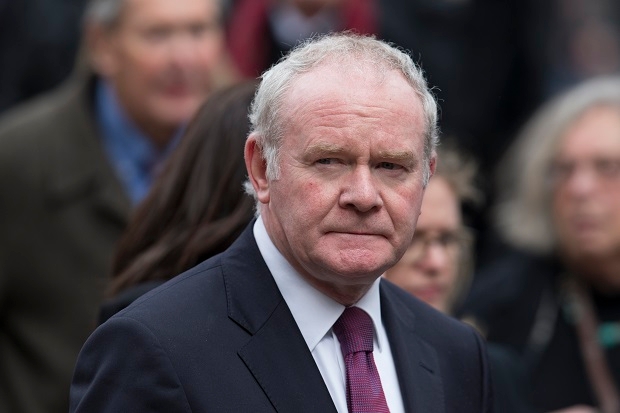Well, those who get themselves worked up about the presence of Martin McGuinness around the Royal Family would not have enjoyed last night’s musical extravaganza, Ceiliuradh, for the Irish president at the Albert Hall. They’d have been on their own, mind you. Everyone else had a ball; it was a packed house for Elvis Costello plus Fiona Shaw and Dermot O’Leary, but the knockout element was the combined band of the Irish Guards and the Irish Defence Force doing the Minstrel Boy, which made me cry. That was a nice touch: Tom Moore, its author, was lionised in London as much as in Ireland. And there in the Royal Box, alongside the president were Prince and Princess Michael of Kent — it was, I have to say, the first time I’ve heard a packed house raise a modest cheer for Princess Michael; she beamed.
But there, tucked away behind them, so far as I could make out, gawking from below, was Martin McGuinness who seemed to be chatting quite comfortably with Peter Robinson. It may have been a hateful spectacle for the pundits who find Mr McGuinness’s presence anywhere intolerable; I thought the sight rather moving. I don’t myself have time for the notion that bygones should be bygones to the extent that any charges for murder during the Troubles should be dropped, on either side — I was really pleased to hear about the Omagh bombing prosecution — but, unless anyone has got any actual evidence to convict Mr McGuinness, then I think he’s better in constitutional politics and welcome at the party, than out of it.
The interesting question, really, is why we got where we are now; why constitutional politics failed in Ireland when it really could have succeeded. And for that the British Tory Party can take a bow. A hundred years ago exactly, as I’ve mentioned before, there was the opportunity to resolve the question through the usual parliamentary methods, though the First and Second Home Rule bills bit the dust. But when the Third Home Rule bill was passed, it was vitiated by the exclusion of Ulster, first temporarily, then permanently. And the reason for this was that British Tories colluded with the militant Ulster Unionists who formed an illegal mass — and I mean, mass — paramilitary movement to resist the workings of parliamentary democracy and were backed to the hilt by the Tories under Bonar Law, and deferred to by Liberals, though mention must also be made of the British officer cadre who refused to obey the instructions of their political masters to take action against the militants.
It’s all there in Ronan Fanning’s admirable recent book, Fatal Path. Mind you, there’d have had to be some kind of exclusion for bits of Ulster but not to the extent that happened, and not by this abject concession to violence and the threat of violence. Non talis modo. The upshot was that the authority of John Redmond, the Irish parliamentary leader, was undermined, and more radical republicans, Sinn Fein, replaced him, with the happy results we have found.
To understand the problem of Martin McGuinness we have to put him in context and the context really does have to go back at least that far. And since David Cameron doesn’t mind doing apologies, one on behalf of the disgraceful behaviour of his party a century ago would be nice.







Comments